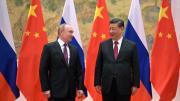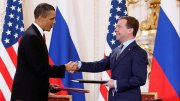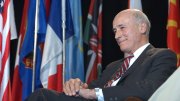How might the war in Ukraine affect the relationship between Russia and China—perhaps the most important prospective big-power alliance in the world? “The honest answer with a lot of these issues is, it’s such a black box that we don’t really know,” China expert Anthony Saich said during a discussion of the subject Thursday afternoon. The Daewoo professor of international affairs and director of the Harvard Kennedy School’s Ash Center for Democratic Governance and Innovation, Saich was interviewed by Alexandra Vacroux, executive director of Harvard’s Davis Center for Russian and Eurasian Studies. A week into the fast-moving crisis that Saich said would realign the global order “for some time to come,” their conversation touched on subjects from China’s wheat imports to Russia’s implied nuclear threats to “the Taiwan question”—the fraught issue of China’s designs on the island nation. But again and again, both kept returning to uncertainties and thorny contradictions.
In some ways, Saich said, the war may bring Russia and China closer together, for reasons both economic and ideological. As the sanctions imposed by the United States and European nations make trade with other large partners nearly impossible, Russia may begin to depend more heavily on China for imports of food and manufacturing parts, and to sell its own exports—especially food and energy. “Already,” Saich said, after sanctions were first announced after the initial invasion, “China customs announced it was lifting the restrictions on Russian wheat, for example.…There are also measures about expanding pipeline capabilities for LGN [liquefied natural gas from northern Russia] coming into China.” (But because China imports its oil supply, the run-up in international crude-oil prices in response to the Russian invasion will be costly for its economy.)
But there is also reason for China to be cautious, Saich added, especially as the sanctions deepen and widen. “The potential risk for China is being too closely identified with Moscow’s interests and getting sucked into the backlash.” Chinese companies engaging with Russia will have to be careful not to trigger penalties for themselves. Calling the relationship between China and Russia largely “transactional,” rather than a deeper partnership, Saich said it will be interesting to see “how much China is willing to accommodate supporting Russia moving forward. A lot will depend on what happens subsequently in Ukraine and the international response.”
Western nations’ decision to remove Russian banks from the SWIFT messaging network was probably “a real shock” for the leadership in Beijing, he added, “because China is so heavily integrated into global financial markets—it’s a $5 trillion engagement. The West needs China in that sense, but China also needs continual access to global financial markets.” The SWIFT sanctions may wind up changing how the country holds its own financial reserves, “so that they do not suffer from that kind of vulnerability.”
The Chinese government is walking “a difficult tightrope” ideologically, Saich continued. Last week, China abstained from voting on a United Nations Security Council resolution condemning Russia, and on Wednesday, the New York Times reported that Xi Jinping knew of Vladimir Putin’s plans to invade Ukraine and asked him to delay until the Beijing Olympics ended. Still, Saich said “There are some signals from China’s reaction that the severity of the Russian movements caught them by surprise.” It’s impossible to be sure, but “my suspicion,” he said, “is that probably Putin told Xi that he was going to move into the eastern parts of Ukraine” and that the operation would be “quick, it would be clean, and it would be very quickly resolved.” Saich noted the joint statement released by the two leaders when they met at the start of the Olympics in early February, which deepened the two countries’ diplomatic ties and asserted that the friendship between them “has no limits.” That statement now puts China in a bind: “It’s very difficult for any official agency to shift too far away from that narrative.”
In some ways, though, he added, China may not wish to shift the narrative. In its official statements, the country’s foreign ministry has lamented the conflict, called for a negotiated peace settlement, and said it respects Ukraine’s sovereignty, “but it persistently continues with the view that this is the fault of the West,” Saich said. “It can’t bring itself to say this is an invasion. It can’t bring itself, obviously, to bring any critical notion of what Russia is doing. Instead, always buried in its comments is the question that this is the need for Russia to have effective security on its borders, and that what has destabilized this is not Putin’s actions, but the eastward expansion of NATO.” Those statements lay particular blame on the United States, whose relationship with China has deteriorated significantly in recent years. “So if we look at it from that perspective,” Saich said, “China hasn’t really changed its tune since it began responding to this.”
Toward the end of the discussion, Vacroux turned to “the elephant in the room”: Taiwan. China perceives the island as a breakaway province that will eventually be “reunified” with the mainland; Taiwan sees itself as a separate and democratic country. Vacroux asked Saich whether Russia’s war in Ukraine and the West’s intense reaction to it might alter Chinese leaders’ calculus about taking action in Taiwan.
“I’m not sure it changes the situation,” Saich said. “The question [of the use of force in Taiwan] does come up, of course, about how long they are willing to wait, with this being pushed off into the future. But I don’t think there is any intention from Beijing to invade Taiwan. It would be an almost impossible task, it would probably be the end of the Chinese Communist Party if they did,” because of the havoc caused by Western economic sanctions and also the difficulty of maintaining the military presence required to repress a large island population. “In Beijing, clearly they do not think it’s a linked issue” between Ukraine and Taiwan. “Ukraine is a sovereign country, as far as Beijing is concerned. Taiwan is not; it’s an integral part of the mainland. So I think they don’t want to draw those parallels.” That’s why in the joint statement between Russia and China, Taiwan was mentioned explicitly, but Ukraine was not.
Finally, Saich offered three broad questions whose eventual answers might illuminate China’s evolving relationship with Russia as the Ukraine crisis unfolds. The first is whether China begins to veto United Nations resolutions condemning Russia, rather than merely abstaining. “The second clear sign would be if Putin installed a puppet government—would Beijing move to recognize it? And how soon would it move to recognize it?” And third, as it becomes ever clearer and unavoidable that civilians are being targeted and killed, and cities attacked, will China alter its refusal to label Russia’s actions as an invasion? “Does the ‘no limits’ in the joint statement have some bearing to this relationship moving forward? Or are we looking at a situation where China does not throw its lot in so obviously with Russia, to maintain some space for itself?”









